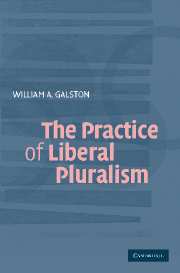Book contents
- Frontmatter
- Contents
- Acknowledgments
- 1 Introduction
- PART I PHILOSOPHICAL FOUNDATIONS OF LIBERAL PLURALISM
- PART II LIBERAL PLURALISM AND PUBLIC ACTION
- PART III POLITICS, MARKETS, AND CIVIC LIFE IN LIBERAL PLURALIST SOCIETIES
- 7 The Public and Its Problems
- 8 The Effects of Modern Markets on Civic Life
- 9 The Politics of Reciprocity: The Theory and Practice of Mutualism
- PART IV DEFENDING LIBERAL PLURALISM
- Index
7 - The Public and Its Problems
Published online by Cambridge University Press: 18 December 2009
- Frontmatter
- Contents
- Acknowledgments
- 1 Introduction
- PART I PHILOSOPHICAL FOUNDATIONS OF LIBERAL PLURALISM
- PART II LIBERAL PLURALISM AND PUBLIC ACTION
- PART III POLITICS, MARKETS, AND CIVIC LIFE IN LIBERAL PLURALIST SOCIETIES
- 7 The Public and Its Problems
- 8 The Effects of Modern Markets on Civic Life
- 9 The Politics of Reciprocity: The Theory and Practice of Mutualism
- PART IV DEFENDING LIBERAL PLURALISM
- Index
Summary
INTRODUCTION
One may wonder how a philosophical approach to politics built on the three pillars of value pluralism, political pluralism, and expressive liberty could yield anything close to a determinate picture of a good society. In key respects it cannot: Pluralists cannot embrace Plato's republic, Rousseau's social contract, or even Rawls's two principles of justice as the picture of the one best form of political organization under the most fortunate circumstances. Pluralists will insist, rather, on two propositions. First, every acceptable polity will fulfill the conditions of minimum decency – that is, it will organize itself so as to minimize the great evils of the human condition. Second, polities that meet the condition of minimum decency can build on that foundation in a wide variety of ways, all of which are legitimate, and there may be no way of judging that, all things considered, decent polity A has a better form of organization than does decent polity B. (A may do better along some dimensions, B along others, with no way of reducing qualitatively different dimensions to a common measure of value.)
A pluralist philosophy, therefore, will leave a wide scope for politics – that is, for public determination of most fundamental political questions. For example, a constitution represents an authoritative partial ordering of public values. It selects a subset of worthy values, brings them to the fore, and subordinates others to them. Within the pluralist understanding, there is no single constitutional ordering that is rationally preferable to all others – certainly not across boundaries of space, time, and culture.
- Type
- Chapter
- Information
- The Practice of Liberal Pluralism , pp. 117 - 127Publisher: Cambridge University PressPrint publication year: 2004



